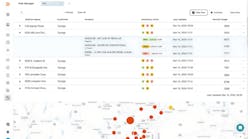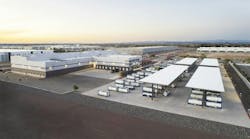THE TANK truck industry has done a poor job of building profitability over the years. In addition, many company executives do a miserable job of asset management.
This needs to change, according to Duff Swain, Trincon Group. He described the current state of tank fleet management in a presentation entitled “Overcoming Management's Greatest Sins” that was delivered at the NTTC annual conference in Chicago, Illinois.
Better productivity is critical because it won't be long before operating costs rise faster than fleets can raise rates. In many cases, improved productivity will mean more 24/7 operations. “Trucking is the only segment of transportation that doesn't do this industry wide,” Swain said.
Number one
Poor productivity is number one on the list of management's greatest sins, according to Swain. The others in the top five are continued reactive response to the driver retention problem, an inability to sell “value added,” lost opportunities for strategic acquisitions, and inadequate management depth and quality.
While driver retention (or more accurately driver retention) is on the list as number two, Swain called it the biggest problem for the trucking industry. “The shortfall for truck drivers is estimated to climb as high as 160,000 over the next 18 months,” he said. “Right now, there is no planned solution.”
The only way the trucking industry will be able to fix the problem is by offering something more to potential drivers. Fleets also need to build a better environment for driver retention.
“The job must be made attractive to a better educated, security-conscious, and career-minded person,” he said. “You must have something to sell to these people. They want a career path, good compensation, benefits, quality of life, quality communication, and quality family time.
Many trucking company managers have an inability to sell value-added services to customers, but that must change. Fleet managers need a better understanding of the market segments and niches served by their companies, and they must develop products that meet specific customer needs.
Strategic acquisitions
Strategic acquisitions are another must. “The trucking industry is consolidating through acquisitions and mergers,” Swain said. “This process will continue, but it is speeding up. Your objective should be to find and acquire carriers that improve your market share and need your help to survive in the future.”
Strategic acquisition candidates have some common traits. They tend to be smaller fleets running 15 to 50 trucks, lack good technology, have no real management depth, but have a solid customer base and an owner with good sales skills.
Fleets need to launch their own search for acquisition candidates. “Don't wait for the M&A broker or for an ad in the newspaper,” Swain said.
Finally, there is a critical need for more management depth and talent in the trucking industry. Fleet executives must be objective about the talents and ability of existing managers. Is the right person in the right position? Do managers have management experience? Do they have the innate abilities to be good managers? Does their personality fit the management team?











